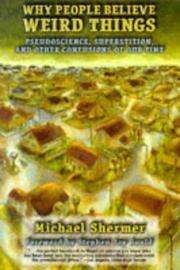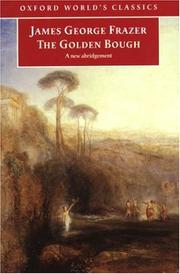| Listing 1 - 10 of 52 | << page >> |
Sort by
|

ISBN: 0716733870 Year: 1997 Publisher: New York, NY W.H. Freeman and Company
Abstract | Keywords | Export | Availability | Bookmark
 Loading...
Loading...Choose an application
- Reference Manager
- EndNote
- RefWorks (Direct export to RefWorks)
pseudoscience --- superstition --- paranoia --- irrationality
Book
ISBN: 1618110128 1618116789 9781618110121 9781618116789 1934843172 9781934843178 Year: 2009 Publisher: Boston : Academic Studies Press,
Abstract | Keywords | Export | Availability | Bookmark
 Loading...
Loading...Choose an application
- Reference Manager
- EndNote
- RefWorks (Direct export to RefWorks)
For several decades David Bethea has written authoritatively on the "mythopoetic thinking" that lies at the heart of classical Russian literature, especially Russian poetry. His theoretically informed essays and books have made a point of turning back to issues of intentionality and biography at a time when authorial agency seems under threat of "erasure" and the question of how writers, and poets in particular, live their lives through their art is increasingly moot. The lichnost' (personhood, psychic totality) of the given writer is all-important, argues Bethea, as it is that which combines the specifically biographical and the capaciously mythical in verbal units that speak simultaneously to different planes of being. Pushkin's Evgeny can be one incarnation of the poet himself and an Everyman rising up to challenge Peter's new world order; Brodsky can be, all at once, Dante and Mandelstam and himself, the exile paying an Orphic visit to Florence (and, by ghostly association, Leningrad).This sort of metempsychosis, where the stories that constitute the Ur-texts of Russian literature are constantly reworked in the biographical myths shaping individual writers' lives, is Bethea's primary focus. This collection contains a liberal sampling of Bethea's most memorable previously published essays along with new studies prepared for this occasion.
Russian literature --- Mythology in literature. --- Superstition in literature. --- History and criticism. --- Anthologies.
Book
ISBN: 1283551128 9786613863577 9004225994 9789004225992 9789004225886 9004225889 Year: 2012 Publisher: Boston Brill
Abstract | Keywords | Export | Availability | Bookmark
 Loading...
Loading...Choose an application
- Reference Manager
- EndNote
- RefWorks (Direct export to RefWorks)
The Assyro-Babylonian omen series Enūma Anu Enlil , written on seventy cuneiform tablets, bears witness to the early understanding of the mutual interactions of heaven and earth on both the physical and the religious levels. To facilitate accessibility, technical and linguistic commentaries as well as an excerpt series were compiled by the scholars of old. This ancient knowledge, which was still largely characterized by mythological concepts, was never completely abandoned, not even when the ‘calculating’ astronomy became prevalent in the first millennium B.C. The series deals in four parts with the moon, the sun, weather phenomena, and fixed stars and planets. This book offers an edition of the texts of the second half of the weather section with the accompanying material.
Akkadian language --- Omens --- Portents --- Prodigies (Omens) --- Signs (Omens) --- Superstition --- Signs and symbols
Book
ISBN: 2221049896 9782221049891 Year: 1988 Publisher: Paris Robert Laffont
Abstract | Keywords | Export | Availability | Bookmark
 Loading...
Loading...Choose an application
- Reference Manager
- EndNote
- RefWorks (Direct export to RefWorks)
Esoteric sciences --- anno 1800-1899 --- anno 1700-1799 --- Magic --- Superstition --- History --- France --- Civilization --- Magie --- Superstitions --- History. --- Histoire --- Civilisation --- Magic - France - History --- Superstition - France - History --- France - Civilization - 1789-1830 --- bijgeloof --- esoterie --- magie --- occulte wetenschappen --- Sorcellerie --- Alchimie --- 1789-1830 --- 19e siecle
Book
ISBN: 0801467314 9780801467318 9780801451447 0801451442 Year: 2013 Publisher: Ithaca Cornell University press
Abstract | Keywords | Export | Availability | Bookmark
 Loading...
Loading...Choose an application
- Reference Manager
- EndNote
- RefWorks (Direct export to RefWorks)
Superstitions are commonplace in the modern world. Mostly, however, they evoke innocuous images of people reading their horoscopes or avoiding black cats. Certain religious practices might also come to mind-praying to St. Christopher or lighting candles for the dead. Benign as they might seem today, such practices were not always perceived that way. In medieval Europe superstitions were considered serious offenses, violations of essential precepts of Christian doctrine or immutable natural laws. But how and why did this come to be? In Fearful Spirits, Reasoned Follies, Michael D. Bailey explores the thorny concept of superstition as it was understood and debated in the Middle Ages.Bailey begins by tracing Christian thinking about superstition from the patristic period through the early and high Middle Ages. He then turns to the later Middle Ages, a period that witnessed an outpouring of writings devoted to superstition-tracts and treatises with titles such as De superstitionibus and Contra vitia superstitionum. Most were written by theologians and other academics based in Europe's universities and courts, men who were increasingly anxious about the proliferation of suspect beliefs and practices, from elite ritual magic to common healing charms, from astrological divination to the observance of signs and omens. As Bailey shows, however, authorities were far more sophisticated in their reasoning than one might suspect, using accusations of superstition in a calculated way to control the boundaries of legitimate religion and acceptable science. This in turn would lay the conceptual groundwork for future discussions of religion, science, and magic in the early modern world. Indeed, by revealing the extent to which early modern thinkers took up old questions about the operation of natural properties and forces using the vocabulary of science rather than of belief, Bailey exposes the powerful but in many ways false dichotomy between the "superstitious" Middle Ages and "rational" European modernity.
Civilization, Medieval. --- Superstition --- Civilization, Medieval --- Medieval civilization --- Middle Ages --- Civilization --- Chivalry --- Renaissance --- Folk beliefs --- Traditions --- Folklore --- Religion --- Religious aspects --- Catholic Church --- History. --- History --- Religious aspects&delete& --- Catholic Church&delete& --- Superstitions --- Civilisation médiévale --- Histoire --- Aspect religieux --- Eglise catholique --- Superstition - Europe - History. --- Superstition - Religious aspects - Catholic Church - History.
Book
ISBN: 0385145152 Year: 1978 Publisher: Garden City Doubleday
Abstract | Keywords | Export | Availability | Bookmark
 Loading...
Loading...Choose an application
- Reference Manager
- EndNote
- RefWorks (Direct export to RefWorks)
Magic --- Mythology --- Religion --- Superstition --- Folk beliefs --- Traditions --- Folklore --- Religion, Primitive --- Atheism --- God --- Irreligion --- Religions --- Theology --- Myths --- Legends --- Gods --- Myth --- Magick --- Necromancy --- Sorcery --- Spells --- Occultism

ISBN: 0191592595 0585110948 9780191592591 9780585110943 0192835416 Year: 1998 Publisher: Oxford Oxford University Press
Abstract | Keywords | Export | Availability | Bookmark
 Loading...
Loading...Choose an application
- Reference Manager
- EndNote
- RefWorks (Direct export to RefWorks)
A classic study of the beliefs and institutions of mankind, and the progress through magic and religion to scientific thought, The Golden Bough has a unique status in modern anthropology and literature. First published in 1890, The Golden Bough was eventually issued in a twelve-volume edition (1906-15) which was abridged in 1922 by the author and his wife. That abridgement has never been reconsidered for a modern audience. In it some of the more controversial passages were dropped, including Frazer's daring speculations on the Crucifixion of Christ. For the first time this one-volume edition r
Mythology --- Religion --- Magic --- Superstition --- Philosophy & Religion --- Mythology, Comparative --- Folk beliefs --- Traditions --- Folklore --- Magick --- Necromancy --- Sorcery --- Spells --- Occultism --- Religion, Primitive --- Atheism --- Irreligion --- Religions --- Theology --- Myths --- Legends --- Gods --- Myth
Book
ISBN: 1139539868 1107228166 128352192X 1139527053 9786613834379 0511920555 1139525859 1139531719 1139530526 1139528246 9781139528245 9781139525855 9780511920554 9781107009073 1107009073 9781139530521 9781139530521 9781139539869 9781107228160 9781139527057 6613834378 9781139531719 Year: 2012 Publisher: Cambridge Cambridge University Press
Abstract | Keywords | Export | Availability | Bookmark
 Loading...
Loading...Choose an application
- Reference Manager
- EndNote
- RefWorks (Direct export to RefWorks)
The Etruscan Brontoscopic Calendar is a rare document of omens foretold by thunder. It long lay hidden, embedded in a Greek translation within a Byzantine treatise from the age of Justinian. The first complete English translation of the Brontoscopic Calendar, this book provides an understanding of Etruscan Iron Age society as revealed through the ancient text, especially the Etruscans' concerns regarding the environment, food, health and disease. Jean MacIntosh Turfa also analyzes the ancient Near Eastern sources of the Calendar and the subjects of its predictions, thereby creating a picture of the complexity of Etruscan society reaching back before the advent of writing and the recording of the calendar.
Etruscans --- Omens. --- Calendar, Greek. --- Astronomy, Greek. --- Greek astronomy --- Greek calendar --- Portents --- Prodigies (Omens) --- Signs (Omens) --- Superstition --- Signs and symbols --- Religion. --- Lydus, Johannes Laurentius, --- Arts and Humanities --- History
Book
ISBN: 0271079894 9780271079899 9780271077772 0271077778 9780271077789 Year: 2017 Publisher: University Park The Pennsylvania State University Press
Abstract | Keywords | Export | Availability | Bookmark
 Loading...
Loading...Choose an application
- Reference Manager
- EndNote
- RefWorks (Direct export to RefWorks)
"A collection of essays on various aspects of the position of magic in the modern world. Essays explore the ways in which modernity has been defined in explicit opposition to magic and superstition, and the ways in which modern proponents of magic have worked to legitimate their practices"--Provided by publisher.
Magic. --- Magic --- Magick --- Necromancy --- Sorcery --- Spells --- Occultism --- History. --- Esoteric sciences --- History of civilization --- Wiccan. --- disenchantment. --- legitimization. --- modernity. --- supernatural. --- superstition. --- twentieth century. --- witchcraft.
Book
ISBN: 9780511800931 9780521863520 9780521682176 9780511480669 0511480660 0511800932 052186352X 0521682177 1107196809 9786612001529 0511479867 1282001523 0511477465 0511476019 0511478984 Year: 2008 Publisher: New York Cambridge University Press
Abstract | Keywords | Export | Availability | Bookmark
 Loading...
Loading...Choose an application
- Reference Manager
- EndNote
- RefWorks (Direct export to RefWorks)
Feng Shui has been known in the West for the last 150 years but has mostly been regarded as a primitive superstition. During the modern period successive regimes in China have suppressed its practice. However, in the last few decades Feng Shui has become a global spiritual movement with professional associations, thousands of titles published on the subject, countless websites devoted to it and millions of users. In this book Ole Bruun explains Feng Shui's Chinese origins and meanings as well as its more recent Western interpretations and global appeal. Unlike the abundance of popular manuals, his Introduction treats Chinese Feng Shui as an academic subject, bridging religion, history and sociology. Individual chapters explain: • the Chinese religious-philosophical background • Chinese uses in rural and urban areas • the history of Feng Shui's reinterpretation in the West • environmental perspectives and other issues
Feng shui. --- Divination --- Arts and Humanities --- Religion --- Feng Shui --- superstition --- spiritual movement --- spirituality --- religion and society --- religion and culture --- Chinese religion --- Chinese philosophy --- the West --- cultural globalization
| Listing 1 - 10 of 52 | << page >> |
Sort by
|

 Search
Search Feedback
Feedback About UniCat
About UniCat  Help
Help News
News